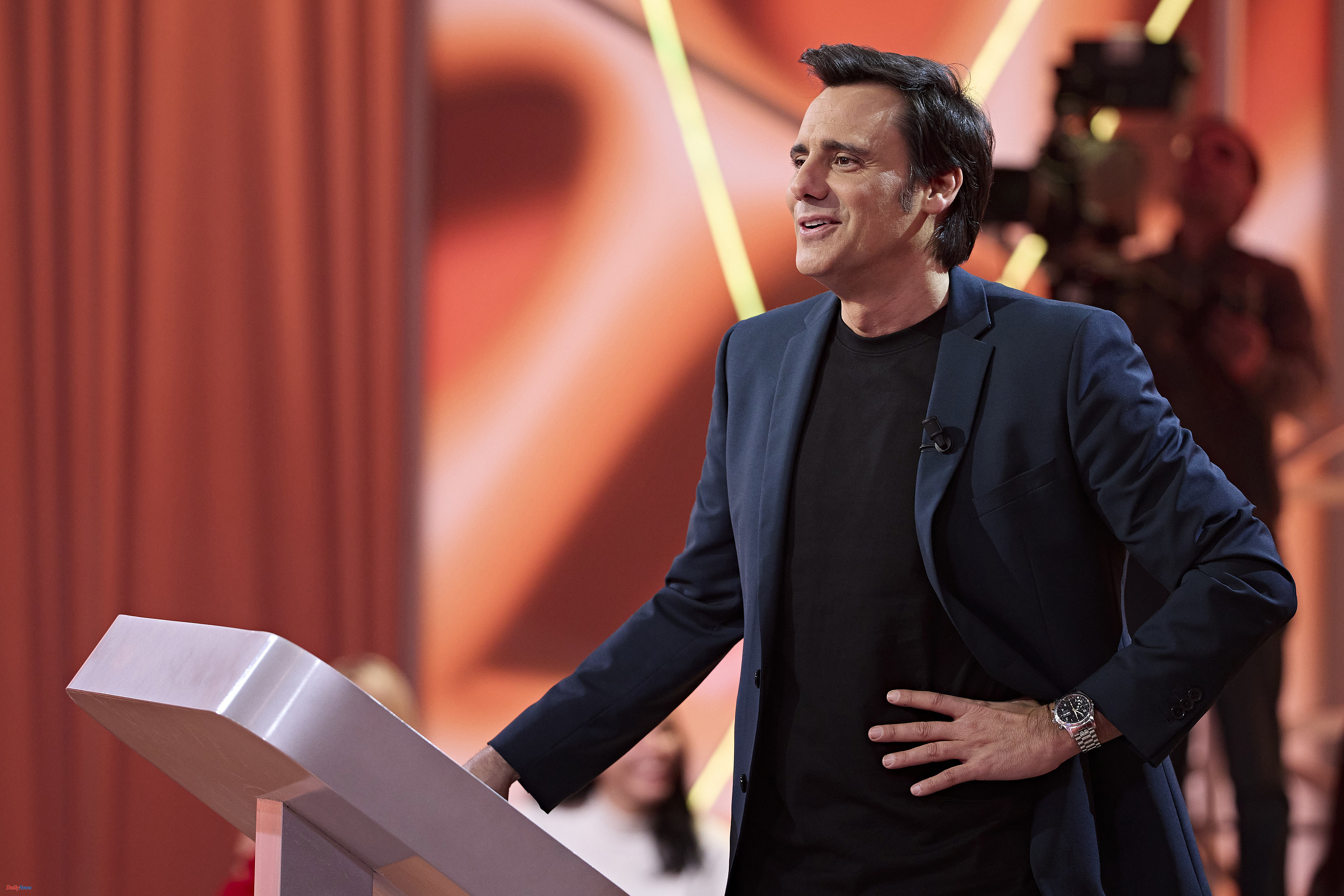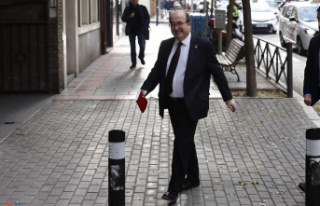At eight in the morning the Las Nieves industrial estate in Villaviciosa de Odón begins to bustle like a coffee pot early in the day. Three days a week for more than 10 hours, 80 people, including filmmakers, cameras, technicians, producers, and many more, record the contest that has become the great savior of Telecinco: Chain Reaction. Three programs compressed into those three days, without rest, without stopping, without losing a second of the enthusiasm and emotion with which Bulldog TV, its production company in collaboration with Mediaset, began a year ago.
"We're going fucking crazy," Edu shouts from production control. "Put me on 1, 5, let's go to... 7. More open! Don't fuck with me! 4, quickly! You're gorgeous." Edu is like a bizarre and brilliant orchestra director who controls everything that is going to be recorded. He is the one who changes the shots, the cameras, the one who talks to Ion Aramendi. With his baton, a black Bic pen that flies every now and then from his hands, Edu is the clear example of what is the key that has turned Chain Reaction into one of the television phenomena of this year: the passion.
"It also means always having your feet planted on what's outside," explains Ernesto Martínez, director of the contest, the man who goes up to Aramendi's dressing room every morning and while the presenter is being made up, he goes over the entire list, each test, each fact. Of course, the answers, not because Ion Aramendi wants to play at the same time as the contestants play. "We are always thinking about those who are watching us, that our spectators can play," he says.
Ernesto always goes from one place to another between recordings. He only sits down when he says "action". The first begins around eleven in the morning, the last ends around five in the afternoon and each one, although it may seem impossible in a television contest where it always seems the same structure, is different. Spontaneity is a necessity in Chain Reaction. That's why Ion Aramendi is the perfect presenter and image. Not only because he already has experience in this game show business - he was the first to host El Cazador on RTVE -, nor because he is currently one of the star presenters of Telecinco - "I don't feel like a star of anything" - but because He likes what he does so much that it is essential for him to be free. And with Chain Reaction it is, they let him, they demand it.
"Within the codes of television I am a little better on television than in my real life"
"Within the codes of television, I am a little better on television than in my real life," reveals the presenter. "I'm not so great, nor am I always so happy or so happy. For me, TV is about entertaining you and for that you first have to enjoy what you do and I enjoy it. If that doesn't happen, forget it," he adds.
If Aramendi wants to dance, let him dance, if he wants to address the audience, let him address himself, if he wants to joke with the contestants, let him joke, if he wants to dress up, let him dress up. Chain reaction is not jack, knight and king. Perhaps that is why since it premiered a year ago, the audience data is the best on Telecinco during the week. Along with Joaquín Prat's morning show, Let's See, Chain Reaction is ensuring an audience share of over 10% every day - the network has an average of 9.5% - and growing. "It's a question of patience," says the presenter. He already warned it on the day of the contest presentation: "If Telecinco is patient, Chain Reaction will work." And Telecinco is not only being patient, but considers the contest right now one of the jewels in the crown. It is not for less.
It is not just a question of screen share or millions of viewers, it is a question of loyalty, of reaching a new audience for a network that wants to renew itself, that wants to reach beyond its traditional audience. Grandparents, children and parents see chain reaction, and not only them, as they tell us, it is also played in schools and there are increasingly younger people hooked: Winning complicity, one of the most emblematic and popular tests of the contest, is a wonder on social networks like TikTok, where the program accumulates almost 96,000 followers and more than 6.5 million likes. In addition, Chain Reaction has featured contestants of all ages, from 19 years old to 67, and all with relationships with each other - cousins, friends, siblings, children and parents.
The contest has not been easy. As Ion Aramendi assures, it is broadcast "in one of the most difficult time slots" and not because it is the afternoon, but because opposite is the star contest, the big one, the one that blows up audiometers, Pasapalabra. The presenter does not want to deceive anyone: every morning he gets up and looks at his audience and that of others, but not with a spirit of revenge or with envy because "there is room for everyone." He looks at it because "anyone who says otherwise lies, lies, and lies." "Here I do my job as best as possible and I give it my all, but in the end we are slaves to the data and that is what makes the program continue, your work continue," he says.
Aramendi has to go out with a bang. The time it takes to place the winning Complicity chair is spent getting some air and answering our questions. This is a non-stop, a bam, bam, bam. When Ion arrives on the set, everything has to be ready: the audience in his place, the lights ready, the teams of contestants on the starting line. They have to work perfectly because if not, it would be impossible to record a daily program. But it is not just the set gear, direction or control, the soul of Chain Reaction, who pumps the blood throughout the system is the team of scriptwriters, coordinated by Alberto Figueroa. From this factory of ideas come all the evidence that adds followers every afternoon. "We are not linguists, nor do we pretend that Chain Reaction is like that," he reveals to us.
"We look for the essential, simplicity," explains Figueroa. "This is not a clever contest, it is a contest for everyone to play," she says. And that is the most difficult thing because they see it from a specialized perspective, but whoever is at home is not. They are children, grandparents, citizens who have not memorized a dictionary. "When we started we always repeated the same phrase: this is about associating words and the association has to be basic, it has to be so simple, but at the same time so difficult that when you say which one is in your house, you let out a ' Of course, it was that one!'" he continues. "The key: impossible not to play and always have fun," says Angelo Rocca, Content Director and founding partner of Bulldog TV, and the person responsible for Chain Reaction reaching Spain after 43 years since its premiere on NBC. .
"We do not deal with topics that have a negative connotation: neither wars, nor health problems, nor political or controversial things."
For example, something that no one knows is that none of the associations, none of the games can have a negative connotation. Neither wars, nor health problems, nor "political or controversial things, that's what there are other programs for," Martínez tells us. In fact, he even takes care of the contestants' styling so that they always wear bright colors. Black, prohibited.
And in the middle of all this mental juggling to turn what is difficult into easy are the contestants and, of course, the casting. Chain reaction has found a goose that lays the golden eggs in the Mozos de Arousa, two brothers and a friend, who since they won Profes Granaínas, have already won more than 130 entries in the contest and more than 900,000 euros. Because yes, in Chain Reaction there is no pot, what you win in each program is already yours. They are the "umbilical cord" that unites the viewer with the program.
The public knows them, loves them, is interested in them and they, consciously, move like a fish in water. Because to be a Chain Reaction contestant you have to have something more than general culture, "you have to have complicity." Casting is based on this, which unlike any other contest, "is a slow process because it is not a question and answer program that you can know because you have read," says its director. "Here it is a matter of three people having to agree and have a lot of training," he concludes.
How far can Chain Reaction go? "As far as you want," says its presenter. "I hope it lasts for a long time, that we reach more and more people, that we compete better and better," he dreams. Because Ion Aramendi wants to retire on this program. "I have wanted to do Chain Reaction for many years and when I couldn't do it anymore or TV didn't love me anymore, I would say 'look, we've come this far, but I've really enjoyed it'."












